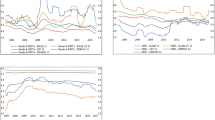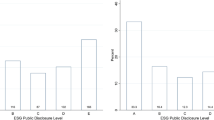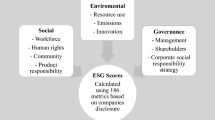Abstract
This paper analyses the Eurozone banks’ short-term market reaction to the introduction of windfall tax in Spain and Italy. Using an event study, I show that stocks react significantly negatively to the windfall tax announcements. The drop was more pronounced for Spanish and Italian banks, which were directly affected by the measure. According to the cash flow hypothesis, an increase in tax burdens/liabilities significantly affects the bank’s cash flows and profitability, leading to a decline in the bank’s market value. High-tax, small, operationally efficient, and profitable banks with high institutional ownership show higher negative abnormal returns to the measure announcement.
Similar content being viewed by others
Notes
Although the windfall tax has also been introduced in the banking sector of other European countries, the case of the Czech Republic, Lithuania and Hungary, the lack of listed banks in these countries or their reduced expression, led the author to only analyse the effects in Spain and Italy.
One of the objectives of the governments of Spain and Italy is that the windfall tax encourages the lenders to pass on more of the benefit they receive from rising policy rates on to customers. However, Spain and Italy continue to be two of the countries with the lowest pass-through rates in Europe. However, it is debatable whether such moves are designed to change lenders’ behaviour or are simply a means of raising quick revenues in a politically painless way.
For more details, please see Serra [25].
References
Amromin, G., P. Harrison, and S. Sharpe. 2008. How Did the 2003 Dividend Tax Cut Affect Stock Prices? Financial Management 37 (4): 625–646.
Baltagi, B.H., D. Li, and Q. Li. 2006. Transaction Tax and Stock Market Behavior: Evidence from an Emerging Market. Empirical Economics 31: 393–408.
Baunsgaard, M. T., and Vernon, N. 2022. Taxing Windfall Profits in the Energy Sector. International Monetary Fund working paper. https://www.elibrary.imf.org/downloadpdf/journals/068/2022/002/068.2022.issue-002-en.pdf.
Boehmer, E., and E.K. Kelley. 2009. Institutional Investors and the Informational Efficiency of Prices. Review of Financial Studies 22 (9): 3563–3594.
Brown, S.J., and J.B. Warner. 1980. Measuring Security Price Performance. Journal of Financial Economics 8 (3): 205–258.
Brown, S.J., and J.B. Warner. 1985. Using Daily Stock Returns: The Case of Event Studies. Journal of Financial Economics 14 (1): 3–31.
Chennells, L. 1997. The Windfall Tax. Fiscal Studies 18 (3): 279–291.
Cutler, D.M. 1988. Tax Reform and the Stock Market: An Asset Price Approach. The American Economic Review 78 (5): 1107–1117.
Edwards, C.H., M.H. Lang, E.L. Maydew, and D.A. Shackelford. 2004. Germany’s Repeal of the Corporate Capital Gains Tax: The Equity Market Response. Journal of the American Taxation Association 26 (s-1): 73–97.
Fama, E.F. 1991. Efficient Capital Markets: II. Journal of Finance 46 (5): 1575–1617.
Fama, E.F., and K.R. French. 1993. Common Risk Factors in the Returns on Stocks and Bonds. Journal of Financial Economics 33 (1): 3–56.
Hebous, M. S., Prihardini, D., and Vernon, N. 2022. Excess Profit Taxes: Historical Perspective and Contemporary Relevance. International Monetary Fund working paper. https://www.elibrary.imf.org/view/journals/001/2022/187/article-A001-en.xml.
Hu, S.Y. 1998. The Effects of the Stock Transaction Tax on the Stock Market-Experiences from Asian Markets. Pacific-Basin Finance Journal 6 (3–4): 347–364.
La Porta, R., F. Lopez-de-Silanes, A. Shleifer, and R. Vishny. 2002. Investor Protection and Corporate Valuation. Journal of Finance 57 (3): 1147–1170.
Liu, J., F.A. Longstaff, and J. Pan. 2003. Dynamic Asset Allocation with Event Risk. Journal of Finance 58 (1): 231–259.
MacKinlay, A.C. 1997. Event Studies in Economics and Finance. Journal of Economic Literature 35 (1): 13–39.
Martins, A.M. 2023. Stock Market Effects of Silicon Valley Bank and Credit Suisse Failure: Evidence for a Sample of European Listed Banks. Finance Research Letters 58: 104296.
Martins, A.M., P. Correia, and R. Gouveia. 2023. Russia-Ukraine Conflict: The Effect on European Banks’ Stock Market Returns. Journal of Multinational Financial Management 67: 100786.
Milonas, K. 2018. Bank Taxes, Leverage, and Risk. Journal of Financial Services Research 54: 145–177.
Modigliani, F., and M.H. Miller. 1958. The Cost of Capital, Corporation Finance and the Theory of Investment. The American Economic Review 48 (3): 261–297.
Nicolay, K., Steinbrenner, D., Wölfing, N., and Julia, S. 2023. The Effectiveness and Distributional Consequences of Excess Profit Taxes or Windfall Taxes in Light of the Commission’s Recommendation to Member States. EPRS: European Parliamentary Research Service. Belgium. Retrieved March 05, 2024, from https://policycommons.net/artifacts/3529089/the-effectiveness-and-distributional-consequences-of-excess-profit-taxes-or-windfall-taxes-in-light-of-the-commissions-recommendation-to-member-states/4329926/. CID: 20.500.12592/bt5jds.
Pennacchi, G. 2019. Banks, Taxes, and Nonbank Competition. Journal of Financial Services Research 55 (1): 1–30.
Ryan, P., and R. J. Taffler. 2004. Are economically significant stock returns and trading volumes driven by firm-specific news releases?. Journal of Business Finance & Accounting, 31(1–2): 49–82.
Schandlbauer, A. 2017. How do Financial Institutions React to a Tax Increase? Journal of Financial Intermediation 30: 86–106.
Serra, A.P. 2004. Event Study Tests: A Brief Survey. Gestão. Org-Revista Electrónica de Gestão Organizacional 2 (3): 248–255.
Sialm, C. 2009. Tax Changes and Asset Pricing. American Economic Review 99 (4): 1356–1383.
Umlauf, S.R. 1993. Transaction Taxes and the Behavior of the Swedish Stock Market. Journal of Financial Economics 33 (2): 227–240.
Wagner, A.F., R.J. Zeckhauser, and A. Ziegler. 2018. Company Stock Price Reactions to the 2016 Election Shock: Trump, Taxes, and Trade. Journal of Financial Economics 130 (2): 428–451.
Whitworth, J., and R.P. Rao. 2010. Do Tax Law Changes Influence Ex-Dividend Stock Price Behavior? Evidence from 1926 to 2005. Financial Management 39 (1): 419–445.
Acknowledgements
This paper is financed by Portuguese national funds through FCT – Fundação para a Ciência e a Tecnologia, I.P., project number UIDB/00685/2020.
Author information
Authors and Affiliations
Corresponding author
Ethics declarations
Conflict of interest
The authors declare that they have no conflict of interest.
Additional information
Publisher's Note
Springer Nature remains neutral with regard to jurisdictional claims in published maps and institutional affiliations.
Rights and permissions
Springer Nature or its licensor (e.g. a society or other partner) holds exclusive rights to this article under a publishing agreement with the author(s) or other rightsholder(s); author self-archiving of the accepted manuscript version of this article is solely governed by the terms of such publishing agreement and applicable law.
About this article
Cite this article
Martins, A.M. Banks stock market reaction to the Italian and Spanish windfall tax announcement: an event study. J Bank Regul (2024). https://doi.org/10.1057/s41261-024-00246-x
Accepted:
Published:
DOI: https://doi.org/10.1057/s41261-024-00246-x




